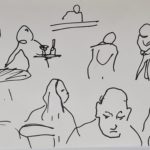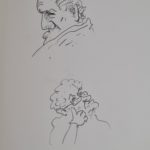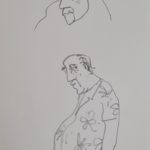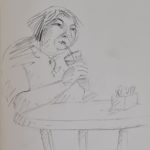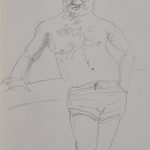One of the main teachings of Buddhism is that desire is the root of suffering. This idea came into sharp focus during the time I spent working on cruise ships. In 2017 and 2018 I had 10 contracts as a guest entertainer doing sand art performances. Of the 7 days onboard I only had to perform on one of those days. This gave me a lot of spare time, much of which I spent drawing. On each cruise I did at least 200 pages of sketches, notes and scribblings.
Since my first year at art school I made a habit of sketching people in public. I would sit at the front of buses and train carriages facing backwards to get a good view of peoples’ faces, or in cafes where people congregated. Human beings have always been my most favoured subjects, as they grapple with the joys and quandaries of their lives. Alas, some the most interesting people I have ever met have been human beings.
On the cruise ships almost all the passengers were either with a partner, a family, or a group of friends. I travelled alone, so I had the perfect opportunity to immerse myself in drawing, uninterrupted. I would find a quiet nook with a good clear view of my unsuspecting subjects, most of whom aided my enterprise by sitting still for long periods of time.
Gradually, over the hours, days and weeks that I spent studying people I distinguished a common trait, a certain demeanour that permeated through the crowd. I had time to speculate: What was this common thread that seemed tie them together? Did they share a collective yearning? What was it that gave them that glazed look in their eyes? Why did such a large proportion of the passengers look so forlorn?
The cruise ship industry makes huge promises; the luxury of being pampered like the rich and famous, an unlimited supply of delicious food, the romance of travelling to exotic locations, the razzmatazz of non-stop entertainment. The motto of one cruise-line (that has been in the news of late) is, ‘Come Back New’.
Such a high level of expectation is a trap that can lead to dissatisfaction and even depression. It is virtually impossible to reach the heady heights promised in the travel brochures. What chance does the average punter have to match this lofty pledge. Retired couples, having worked hard for years, saving their dollars, seized the opportunity to have the ‘holiday of a lifetime’. They embarked with high hopes to find joy, serenity, fulfilment, and as spelled out in the title of that famous television show set on a cruise ship, Love.
And yet, they are often left feeling disappointed. As the days pass it becomes apparent that their lives haven’t been transformed. The old familiar problems have accompanied them onboard. The niggling issues within their relationships, their doubts and fears and insecurities have not evaporated. All that remains after the day trip to the tourist hotspot, after the three-course continental dinner had gone down, and after the glittering song and dance extravaganza is over, is a sense of anti-climax.
The conclusion of my ontological investigations is that cruise ships harbour a particular aspect of the human condition: that suffering stems from desire. This assertion was validated when I returned to my room and looked back over my sketches. It could be argued that my opinion compromised my impartiality so that the next time a put pen to paper I accentuated the crest-fallen bearing of my subjects.
None-the-less, I feel that I did capture a certain truth that permeates the world of the leisure cruise: that, striving for happiness can be a rather sad affair!





